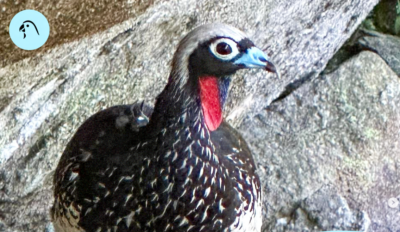
Next time you consider a dish with hearts of palm, check the source. Hearts of palm are the tiny edible portions of the palm tree just below the branches. It’s the “heart” of the tree and for culinary purposes comes from one of several edible palms. Some are harvested from US palmettos which are the domestic variety and more sustainable. But if it’s imported from South America, there are a few trees that are cut for the heart of palm – primarily peach-palm, and açai palm – both of which are from the Amazonian rainforest and have two stems. The juçara palm (Euterpe edulis) is native to the Atlantic Rainforest and has only one stem. Why is this important? To remove the small edible part which is the heart, the top of the tree is removed. Most trees with two stems eventually grow back – making this a more sustainable option. But cutting the one stem of the juçara palm and removing its heart kills the tree. And, illegally harvesting it from the juçara palm is sending an important bird to extinction.
Enter the endangered Black-fronted Piping Guan, (locally known as Jacutinga from their Latin name pipile jacutinga) – a large, intensely curious and animated, slightly goofy-looking black and white bird with blue and red accents that is one of the best seed dispersers in the Atlantic Forest. They rely heavily on the palm nuts of the juçara palm for food so are uniquely evolved to replant the forest naturally. Given 88% of the Atlantic Forest has been taken down, the guans’ ability to fulfill their role is more important than ever to help with reforestation. But the juçara palm is protected and is illegally cut down to get the heart of palm. The disappearance of this tree from the forest is causing the Black-fronted Piping Guan to also disappear.
SAVE Brasil, a partner of Birdlife International, has a reintroduction project in the Atlantic Forest for these birds. And they work on behalf of the protection of the birds and their habitat. But eliminating the demand for juçara palm hearts would mitigate the primary cause of this bird’s disappearance. How to do this? SAVE Brasil has a few recommendations for how to avoid buying hearts of palm from the juçara palm:
- choose hearts of palm brands registered by IBAMA (information that can be seen on the lid)
- Prefer açaí palm hearts or peach palms, these palm trees do not die during the removal of the palm hearts, and will grow again
- Only purchase certified juçara palm hearts
- Buy açaí and other products based on fruits from the juçara palm tree, which are a sustainable source of income for communities that previously sold juçara palms illegally
See more cool birds from Brasil on SAVE Brasil’s Instagram